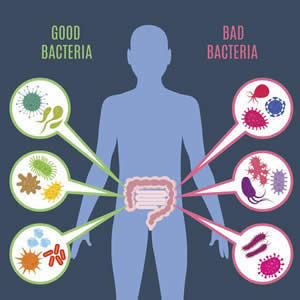
Flatulence
Flatulence and bloating
Causes of flatulence
How to stop flatulence
Flatulence and bloating
Everyone has a little gas in the colon. Sometimes the level of gas and disturbance may be higher, causing both burping and farting. This is a common complaint. Excessive gas can also cause bloating, an uncomfortable feeling of fullness in the abdomen. Sometimes bloating is accompanied by sharp pains or rumbling noises in the abdomen.
Gas in the abdomen can come from:
- Being swallowed while eating/drinking/talking.
- As a by-product of digesting certain types of food.
- From the incomplete digestion of food that is then fermented.
A healthy digestive system does not continually produce large amounts of gas, especially on a low-sugar, non-processed food diet. If you produce an abnormal amount of gas, or it is accompanied by other digestive complaints such as irritable bowel syndrome (IBS), then there are steps you can take to remedy the situation.
Nitrogen is usually the main gas released in a fart. Hydrogen, carbon dioxide, oxygen and methane are also usually there in varying quantities. These gases don't have a foul smell. Methane and hydrogen are inflammable and can be ignited. Usually, you need specific archaea or bacteria in your digestive tract to produce methane or hydrogen. When the gas from a flatus (fart) has an unpleasant odor, it may be due to the presence of skatole and indole, which are by-products of the digestion of meat and some other proteins. However, other foul-smelling gases such as methanethiol, hydrogen sulfide (rotten egg smell) and dimethyl sulfide also make up the smell.
Causes of flatulence
- Weak digestion. Poorly digested foods, particularly proteins, produce a strong unpleasant smell. One of the main causes of weak digestion is insufficient stomach acid.
- Certain foods are well known to produce gas. They include beans, lentils, dairy products, scallions, leeks, turnips, rutabagas, radishes, sweet potatoes, potatoes, cashews, Jerusalem artichokes, oats, wheat, and yeast in breads. Cauliflower, broccoli, cabbage, Brussels sprouts and other cruciferous vegetables (brassica genus). These foods also make a bad smell. Interestingly, most are FODMAP foods.
- Candida. An overgrowth of candida and other yeasts in the digestive tract can cause excessive gas and many other complaints. Yeasts thrive on sugars, and produce carbon dioxide and alcohol. This type of gas does not have a strong odour.
- Fructose malabsorption. This is a very common complaint, and many people have found that avoiding FODMAP foods has quickly cured the problem.
- Food intolerance/allergy. Some individuals may lack the digestive enzymes to digest certain foods, or have an allergic reaction or intolerance to certain foods.
- Lactose intolerance. Some people may lack the enzymes needed to digest milk sugars. When they consume dairy products, the sugars (lactose, galactose etc) are not digested, and intestinal bacteria feeding on the sugars produce excessive gas.
- IBS. Sometimes, bloating and flatulence are due to a bowel disorder such as irritable bowel syndrome.
- Sliding hiatus hernia syndrome.
- Eating too fast.
How to stop flatulence
- Try to identify the foods that cause your gas. Keep a food diary. Monitor when you feel well or gassy. Try to identify specific foods, spices that may cause gas. Take note if raw foods are a problem.
With candida, it is foods that contain sugar - bread, foods made with flour, sweet foods and fruits. In other cases gassy foods may include beans, broccoli, cabbage, cauliflower, garlic, onions, radishes and sprouts. - Apple cider vinegar to increase stomach acidity and improve digestion, especially of proteins.
- Try eating a low FODMAP diet.
- Gut biome sequencing.
- Avoid processed foods (factory-made foods), and foods made with refined carbohydrates, sugar and chemicals. Eat the kind of foods I recommend in Grow Youthful and my recipe book.
- Probiotics improve digestive power and reduce gas production.
- Exercise regularly, particularly walking, which massages the abdomen and stimulates peristalsis.
- Eat and drink slowly, chew foods thoroughly.
- Avoid cold foods and drinks.

Get your gut microbiome sequenced
- buy a simple test kit
